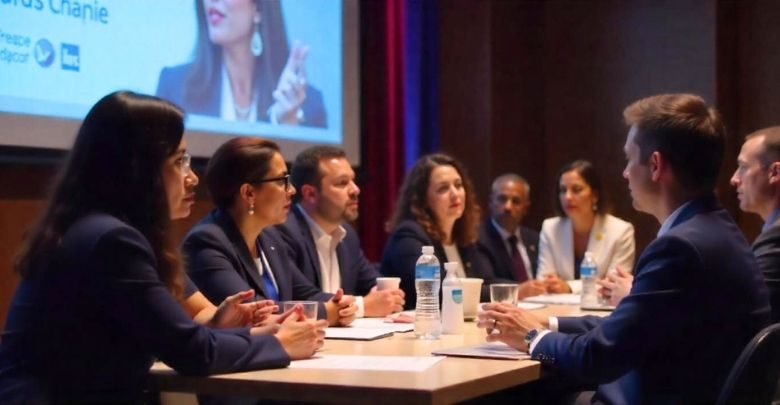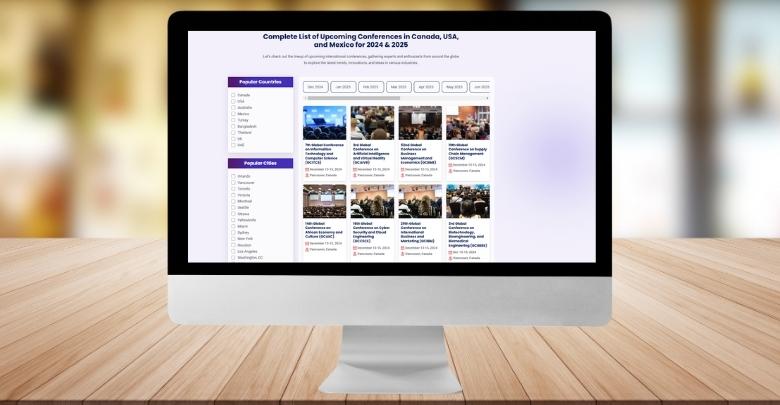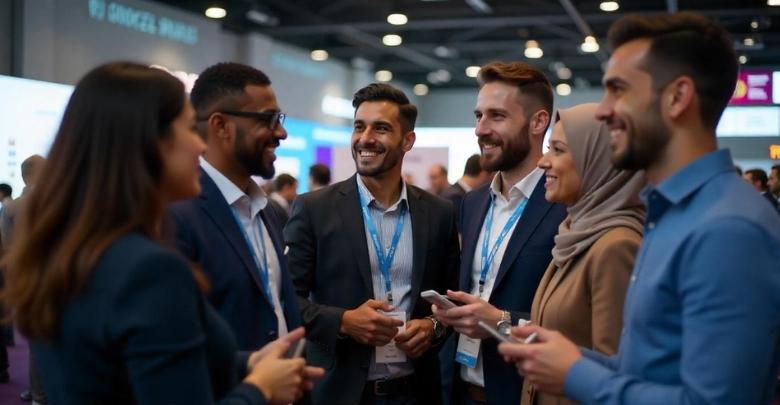Researchers, industry professionals, and innovators come together at engineering conferences to exchange ideas, work together, and propel new advancements. For anyone interested in exploring these opportunities, a common question often arises: How to apply for engineering conference? This is an essential step to start your path toward professional growth.
To apply for engineering conference, you first need to identify a conference that aligns with your field and goals. Once you’ve found the right event, review the requirements carefully, including any documents, deadlines, and eligibility criteria. Next, gather necessary materials like your resume, personal statement, and possibly a recommendation letter or abstract.
Curious to know more? Read on to discover everything from the application process to tips on making the most of your conference experience. This article covers every detail to help you prepare confidently and maximize your learning.
What Makes Engineering Conference Must-Attend For Professionals?
Engineering conferences are invaluable for professionals looking to stay current in a fast-evolving field. These events provide insights into the latest advancements, research, and best practices across various engineering disciplines. Attending allows professionals to learn directly from industry leaders and innovators, enhancing their expertise and professional growth.

Conferences worldwide, including in the US, UK, Australia, and Canada, serve as crucial hubs for knowledge-sharing and networking. Attending upcoming engineering conferences in Canada, you can connect with peers, explore the latest technologies, and gain insights specific to their field. Such events encourage international collaboration, offering professionals the chance to engage with diverse ideas and approaches.
Moreover, engineering conferences offer an excellent platform to showcase one’s work, receive feedback, and expand professional networks. Attending these events supports career advancement and helps professionals stay competitive in a dynamic industry scenery.
Engineering Conferences: Who Should Attend?
Engineers meet at engineering conferences to exchange ideas and shape emerging technologies. These events connect professionals to collaborate, learn, and grow. There is much to explore about who attends and what they contribute.
Industry Professionals and Innovators
The event attracts professionals from a variety of industries interested in exploring new ideas and implementing them in their work. During discussions, they share practical challenges and innovative solutions. By connecting, they expand their networks, stay up-to-date on trends, and help push technology forward by developing new industry standards.
Academic Researchers and Educators
To share new theories and research findings with their peers, researchers and educators attend. Their goal is to exchange knowledge, discuss emerging trends, and collaborate on future projects. By incorporating these experts’ insightful observations into their academic work, engineering knowledge is further advanced.
Engineering Students and Young Professionals
Learning from seasoned experts and engaging in discussions is a top priority for students and young professionals. They attend workshops to improve their skills and explore career opportunities. By interacting with industry leaders, they gain practical insights that influence their future careers in engineering, helping them understand real-world challenges and solutions.
Corporate Representatives and Sponsors
Companies send representatives to conferences to present innovations and new technologies. Their role includes sponsoring events and hosting exhibits to promote products and services. These representatives interact with potential clients, partners, and collaborators, helping promote new business opportunities and promoting the latest advancements in the engineering sector.
Government and Policy Makers
During the conference, government officials and policymakers examine how technological advancements affect regulations and society. They gather insights into industry trends and challenges, which help in developing policies. Their attendance ensures that the regulatory system develops along with technological developments, promoting safety, ethics, and the well-being of society.
Diverse groups come together at engineering conferences, and each one advances the field. Professionals, educators, students, and policymakers share ideas, encouraging innovation, collaboration, and growth. These events are key to the development of engineering technologies and policies.
What Are the Steps to Apply for an Engineering Conference?
From learning new things to connecting with professionals in the field, attending an engineering conference has many advantages for your career. Applying may seem complex, but with the right steps, it becomes manageable. Here’s a simple guide to help you begin.
Step 1. Identify Relevant Conferences
Look for conferences that align with your engineering field, goals, and interests. Research events that provide specific knowledge and networking opportunities relevant to your career. When you find a suitable conference, note the deadlines to ensure you have enough time to complete each step of the application smoothly and effectively.
Step 2. Review Conference Requirements
Carefully read each conference’s requirements to avoid surprises. Often, requirements include application guidelines, submission deadlines, and eligibility criteria. Reviewing these details helps ensure you don’t overlook any necessary documents or conditions. With clear guidelines in hand, you can create an organized approach that will streamline the application process.
Step 3. Prepare Your Application Materials
Gather your resume, cover letter, and any other required documentation. Your materials should showcase your achievements, interests, and reasons for attending. Preparing these in advance helps you avoid rushing at the last minute and allows you to present a well-organized, polished application that reflects your commitment and readiness.
Step 4. Write a Strong Personal Statement
When applying for conferences, personal statements are frequently crucial because they allow you to discuss why you are applying. Describe why you want to attend, what you hope to gain, and how the event aligns with your career. A clear and genuine statement can make your application stand out and improve your chances of acceptance.
Step 5. Seek Recommendations or Endorsements
Some conferences may require recommendation letters or endorsements from professors or industry professionals. Choose individuals who understand your skills, dedication, and goals. Asking for recommendations early gives your contacts time to write thoughtful endorsements, and these can strengthen your application by highlighting your potential and relevant experiences.
Step 6. Fill Out the Application Form
Complete the application form carefully, ensuring accuracy in each field. Double-check your contact details, academic or professional information, and responses. Completing the form accurately demonstrates your attention to detail, which conference organizers appreciate. A well-completed application form creates a positive impression and reflects your commitment to the process.
Step 7. Submit Any Required Abstract or Proposal
Some engineering conferences require an abstract or proposal submission if you plan to present. Ensure your abstract clearly and concisely outlines your research, ideas, or innovations. A well-prepared abstract or proposal highlights your expertise and readiness to contribute, giving you a competitive edge and boosting your chances of selection.
Step 8. Check for Funding or Scholarship Opportunities
Many conferences offer grants, scholarships, or financial assistance to attendees. Explore these options early, as funding applications may have additional requirements or deadlines. Securing financial support can help make your conference attendance more affordable, and it shows your proactive approach to maximizing this learning opportunity.
Step 9. Track Your Application Status
After submission, keep track of your application status and any correspondence from the conference organizers. Follow up as necessary, but give them time to process applications. Monitoring your status helps you stay informed and prepared for any additional steps, ensuring you don’t miss any updates or important deadlines.
Step 10. Prepare for Acceptance
If accepted, start preparing by organizing travel, accommodation, and any required materials. Early preparation ensures you can focus on making the most of the conference. Being ready also allows you to engage fully in networking and learning, helping you gain maximum benefit from the experience.
Applying to an engineering conference requires careful planning and organization. By following these steps and staying focused, you’ll be well-prepared to make the most of your conference experience and expand your professional opportunities.
Where Can I Find Engineering Conferences?
Taking part in an engineering conference can increase your knowledge, expand your professional network, and open new career opportunities. Conferences bring together experts, innovators, and students, all eager to share ideas. Below are some ways to find one that suits you.
Research Online Platforms
Many websites provide listings of upcoming conferences, making it easier to choose the best engineering conference for your needs. Platforms like Global Conference Alliance Inc. offer detailed event calendars, often allowing you to filter events based on your interests, location, and academic level. Some even send email alerts about new conferences and deadlines. This method is an effective way to find events that align with your specific field of engineering.
Check Academic Institutions
Many universities and research institutions host or sponsor engineering conferences. These events may focus on specific fields, like mechanical, civil, or electrical engineering. Academic institutions often provide a platform for students, professors, and industry leaders to discuss recent trends. University websites, newsletters, or academic journals often include details on these conferences. Getting involved in such events can be a great way to stay updated on the latest research.
Use Social Media Groups
Social media is a powerful tool for discovering engineering events. Platforms like LinkedIn and Facebook have groups dedicated to engineering professionals. These groups share event announcements, conference details, and registration links. Joining these groups can help you stay connected with the community and receive real-time updates. Social media is also a place where people discuss past conferences and recommend events to attend.
Join Professional Organizations
Becoming a member of a professional engineering organization is one of the best ways to find conferences. These organizations often host their events and provide members with exclusive access to conference opportunities. They may also partner with other groups to sponsor large conferences. Membership allows you to receive notifications about upcoming conferences, as well as potential discounts or scholarships for attendees.
Network with Industry Peers
Making connections with people in your industry can be a great way to find out about conferences. An excellent source of information is engineers, many of whom regularly attend or present at conferences. Reaching out to industry peers, mentors, or past conference attendees can give you insight into the best events. Additionally, these individuals may share tips on how to maximize your experience at these conferences.
What to Look for When Finding an Engineering Conference?
Selecting the ideal engineering conference advances your career and stokes your creative spirit. The right event provides valuable insights, networking opportunities, and memorable moments. Here’s what to look for when attending a conference.
Relevance to Your Field
Look for conferences that align with your specific engineering specialty, whether it’s civil, mechanical, electrical, or another area. This relevance ensures that the sessions, workshops, and speakers cater directly to your interests. Attending a focused conference can also lead to deeper discussions and more meaningful connections, and it maximizes your time investment.
Quality of Speakers and Presenters
Well-established conferences attract industry-leading speakers and presenters who bring real-world experience and innovative knowledge. These experts share insights that can increase your engineering conference experience, introducing you to new techniques and industry trends. Review the speaker lineup and ensure their expertise aligns with your learning goals.
Opportunities for Networking
Conferences are unique for connecting with professionals, students, and mentors who share your engineering interests. Networking sessions, group activities, and informal gatherings create the ideal setting to exchange ideas and develop meaningful professional relationships. These opportunities add value to the experience, providing long-term career benefits.
Hands-On Workshops and Technical Sessions
Events offering hands-on workshops, technical sessions, and live demonstrations allow for a more immersive experience. These interactive elements are key to a productive conference, as they let you apply knowledge practically. Sessions like these often go beyond lectures, enhancing learning and providing practical skills you can use immediately.
Location and Accessibility
The location of the conference matters, especially when considering travel, accommodation, and accessibility. A convenient venue helps you focus on learning rather than logistics. Additionally, check whether the conference offers virtual attendance options, making it more flexible and accessible to attend without extensive travel.
A well-planned conference advances your career and offers memorable learning moments. Focus on relevance, networking, and interactive sessions to maximize your time and enjoy a rewarding event.
What Documents Do You Need for an Engineering Conference Application?
To increase your chances of getting accepted to an engineering conference, you must prepare your documents precisely. Meeting every document requirement enhances your application’s strength and portrays you as a serious, committed attendee. Let’s explore the essential documents you need for a smooth application process:
- Abstract: The summary of your research or project should capture the essence and significance of your work engagingly and concisely.
- Full Paper: Provide a detailed report of your study, including methodology, results, and discussions, to give the committee a complete knowledge of your research.
- CV/Resume: Highlight your academic qualifications, professional experience, and notable achievements relevant to the engineering field to demonstrate your expertise.
- Letter of Recommendation: Secure endorsements from respected individuals who can attest to your skills, accomplishments, and potential contributions to the conference.
- Proof of Membership: Include documentation verifying your active participation in relevant engineering societies or professional organizations if required by the conference.
- Cover Letter: Clearly articulate your motivation for attending the conference, your research interests, and the benefits you hope to gain from participating.
- Presentation Slides: Prepare a concise and visually engaging summary of your research to effectively communicate your key points during your presentation.
Some Mistakes to Avoid When Applying for an Engineering Conference
Applying to an engineering conference offers a chance to share insights and expand professional connections. But even skilled applicants can overlook key steps. Here’s how to avoid common mistakes and increase your chances of success:
Ignoring Conference Requirements
Many applicants skip important requirements, missing details essential to their success. Knowing guidelines helps you shape your submission toward specific goals. Each instruction matters, as even small omissions can lead to rejection. Customize your submission with essential details to meet conference expectations fully and enhance your appeal as a candidate.
Submitting Generic Applications
Making a generic application submission can give the wrong impression. Each engineering conference features unique goals, which should form how you present yourself. Customizing your application to align with the conference theme shows effort and genuine interest. Highlight your relevant experiences and skills to increase engagement with conference reviewers and make a lasting impression.
Missing the Submission Deadline
No matter how strong your application is, you should meet submission deadlines because failing to do so may result in disqualification. Organizers need timely submissions to plan the event properly. Set reminders and submit early to avoid problems. Following deadlines shows respect for the process and allows reviewers to evaluate your application fairly.
Avoiding the Importance of Networking
Networking plays an essential role in both your application and conference experience. Connecting with organizers, speakers, or past attendees before applying offers helpful insights. Referencing relevant contacts or shared information can add value. Developing these connections boosts credibility and demonstrates dedication, helping you stand out among other applicants.
Skipping a Quality Review Process
Some applicants skip a thorough review, risking errors that can harm their credibility. Reviewing your application ensures accuracy and clarity, showing professionalism. Seek feedback from peers or mentors to catch any issues. A well-reviewed application with clear language and zero errors reflects strong attention to detail, leaving a positive impression.
What to Expect After Submitting Your Engineering Conference Application?
When you submit your application for an engineering conference, the process unfolds step by step. Knowing these stages can help you figure out what lies ahead and prepare for any follow-up actions. Here’s what typically happens next:
- Application Review: A committee reviews all submissions to ensure they meet the conference standards. They check eligibility, your topic’s relevance, and overall alignment with the event’s focus.
- Eligibility Verification: Your background, qualifications, and topic expertise are evaluated to see if you meet the conference’s eligibility criteria. This ensures that selected participants align with the event’s goals.
- Topic Relevance Check: Reviewers check whether your proposed topic resonates with the conference’s main themes. They look for subjects that promote growth and engage participants across various engineering fields.
- Notification of Acceptance: Once approved, you’ll receive an official acceptance letter or email detailing the next steps. This may include registration information and any required preparations for your presentation.
- Registration and Payment: Accepted applicants are often required to confirm their participation by completing registration and paying any fees. This step finalizes your spot at the conference.
- Pre-Conference Preparations: Guidelines for creating materials, presentations, or workshops are usually given to participants. These instructions help ensure that all presentations meet conference standards and provide valuable insights.
- Networking Opportunities: You’ll be informed of networking sessions and workshops where you can connect with industry peers. These gatherings are designed to encourage professional relationships and knowledge sharing.
After submitting your application, following each step carefully can ensure a smooth experience and better conference preparation. Remember, every stage brings you closer to participating in a valuable engineering event and expanding your professional network.
How to Prepare for an Engineering Conference After Applying?
Taking part in an engineering conference opens doors to learning, networking, and professional growth. Once your application is submitted, it’s essential to prepare thoughtfully for the experience. Here’s a step-by-step guide to make the most of your conference journey.
Step 1. Research Key Topics and Speakers
Begin by knowing the conference’s main themes and identifying any keynote speakers or panelists. This helps you focus on relevant sessions and note speakers whose insights align with your interests. Familiarizing yourself with topics improves engagement and helps you prepare questions for discussions.
Step 2. Prepare Materials and Talking Points
Organize any documents, resumes, or business cards you may need to share. Plan talking points about your projects, skills, or interests that you want to discuss. Having these ready makes conversations smoother and more memorable, showing professionalism and interest in sharing knowledge.
Step 3. Plan Your Schedule Strategically
Review the conference schedule and choose sessions that align with your goals and interests. Planning your time strategically allows you to attend key talks and networking events without feeling overwhelmed. Knowing your schedule helps you manage your time and maximize the conference experience.
Step 4. Practice for Introducing Yourself Confidently
Make sure your introduction is clear and delivers your objectives and background. A confident introduction helps you start conversations and make connections easily. Consider practicing with friends or colleagues to improve comfort and ensure you make a strong, memorable impression.
Step 5. Review and Prepare Questions
Think about questions you’d like to ask about topics and speakers you’re interested in. By doing this, you demonstrate engagement in sessions and stand out in one-on-one conversations. Good questions lead to more meaningful conversations, allowing you to gain valuable insights and connect with others professionally.
Preparing for an engineering conference requires focus, strategy, and genuine engagement. Following these steps will help you make the most of your experience and connect with others in meaningful ways.
Tips for Making the Most of Your Engineering Conference Experience
You can learn, network, and gain insights from industry experts by attending an engineering conference. Planning well and focusing on specific strategies can help you maximize the experience and take away valuable knowledge.
Set Clear Goals Before Attending
Identify what you want to achieve before the event. Clear goals, like networking, learning about new technologies, or gaining insights, will keep you focused. This approach helps you make decisions on which sessions to attend.
Engage Actively in Sessions
Participating fully in each session deepens your understanding of the topics covered. Take notes, ask questions, and discuss ideas with fellow attendees. Engaging with others enhances your grasp of complex concepts and broadens your knowledge.
Network with Industry Leaders
Seek out opportunities to connect with speakers, panelists, and other participants. Conversations with industry experts can give you new perspectives and advice. Many conferences provide structured networking events for connecting with professionals in your field.
Prioritize Workshops and Hands-On Experiences
Workshops provide practical knowledge and valuable insights through hands-on activities. Instead of focusing only on lectures, attend sessions where you can interact directly with technology. Learning through active participation will deepen your technical skills.
Follow Up After the Conference
After the event, connect with people you met and review your notes to retain what you learned. Networking beyond the conference strengthens relationships and ensures you stay updated on industry advancements.
Frequently Asked Questions (FAQs)
Here’s a quick guide to help answer common questions about applying for an engineering conference. Whether you’re confused about the application requirements or looking to learn more about the selection process, these FAQs will clarify the essentials and help you apply with confidence.
What Are The Basic Requirements For Applying?
When applying for an engineering conference, you typically need to submit your resume, a cover letter, and sometimes an abstract or personal statement. Review the conference’s website for specific requirements, as some may ask for additional documents such as letters of recommendation or proof of active membership in relevant engineering organizations.
Can Students Apply For Engineering Conferences?
Yes, students can apply for engineering conferences, and many conferences specifically encourage student participation. Some even offer discounts or scholarships to help with costs. Students should prepare their application materials carefully, focusing on their academic interests, research, and goals, to demonstrate their potential value to the conference and its audience.
Is There A Fee To Apply For An Engineering Conference?
No, most engineering conferences charge an application or registration fee. Fees vary depending on the event, and some may offer early-bird discounts or reduced rates for students. Check each conference’s website for detailed pricing information, as well as any available scholarships or financial assistance options for attendees.
How Long Does It Take To Process An Application?
The processing time for engineering conference applications typically ranges from a few weeks to a month. You’ll likely receive an email notification confirming whether your application was successful. Keep track of the timeline and be patient, as conference organizers usually have a high volume of applications to review and process.
What Can I Do to Increase My Chances Of Acceptance?
To increase your chances of acceptance, ensure your application is well organized and aligned with the conference’s focus. Customize your personal statement to reflect the conference themes and clearly outline your goals. Presenting a unique perspective, showcasing relevant achievements, and submitting all required documents on time can significantly improve your application.
Bottom Line
Participating in an engineering conference is an exciting opportunity to learn, grow, and expand your professional network. By preparing thoroughly, you can make the most of this experience and take away valuable insights that will benefit your career.
To answer the question: How to apply for engineering conference? Start by identifying conferences that align with your interests. Review the specific requirements, prepare your materials, and submit your application before the deadline. Pay attention to each step, and follow the guidelines carefully.
As you move forward, remember to stay organized and focused. Take time to plan your application, engage actively during the conference, and follow up afterwards. Best of luck, and we wish you great success in your application and future activities!









